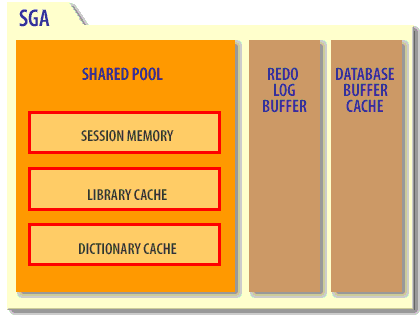Lesson 1
Shared Pool Tuning in Oracle
Now that you have a broad understanding of how
This module discusses how to tune the shared pool.
Because the library cache plays such an integral role in shared pool tuning, much of this module is devoted to exploring the numerous considerations of tuning via the library cache.
The MouseOver below will help you review the components of the shared pool.
- the dictionary cache,
- the library cache, and
- the UGA session memory
This module discusses how to tune the shared pool.
Because the library cache plays such an integral role in shared pool tuning, much of this module is devoted to exploring the numerous considerations of tuning via the library cache.
The MouseOver below will help you review the components of the shared pool.

- This stores the plan information for SQL that is currently being executed. This area also holds stored procedures and trigger code. The SQL areas within the library cache hold SQL in the hope that a repeated SQL statement would not need to be re-parsed each time the SQL is processed.
- This stores environmental information, including referential integrity, table definitions, indexing information, and other metadata stored within Oracle's internal tables.
- This stores session information for systems that are using SQL*Net or Net8 with Oracle's multithreaded server. For systems that do not use the MTS, this area will not use much space.
Shared Pool Components